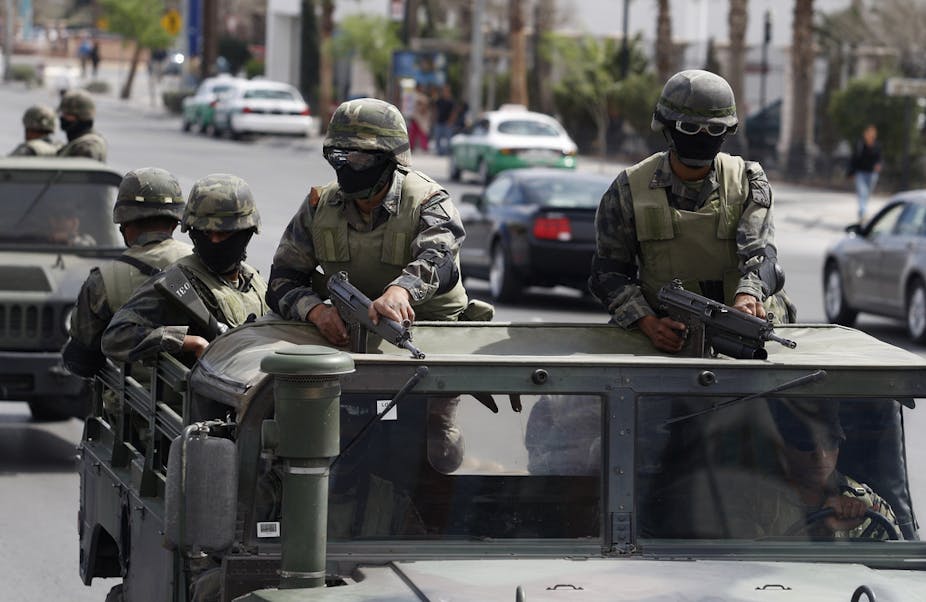The capture of Miguel Ángel Treviño Morales, the leader of the notorious drug cartel Los Zetas - one of the world’s most dangerous criminal organisations, will provide Enrique Peña Nieto’s Mexican government with a public relations triumph, demonstrating his administration’s commitment to combating the influence of organised crime.
Since he took power last December, there have been few, if any, encouraging signs that the strategy of the new administration differs much from the disastrous and tragic policies of his predecessor, Felipe Calderón.
As leader of the Zetas, Treviño will now face charges of drug trafficking, money laundering, torture, illegal possession of firearms and the murder of 256 migrants. Since they emerged in the late 1990s, Los Zetas, formed by ex-members of elite and (ironically) anti-drug squads of the Mexican military, have gained a reputation for their unflinching ruthlessness and brutality.
Yet while Treviño’s arrest will be no doubt milked by drug war propagandists both in Mexico and the United States, there is little indication that this latest sting will bring substantial and meaningful change to the population.
While removing the head of the organisation could lead to more infighting and competition for control within the Zetas, part of the organisation’s brand identity is its rigorous discipline and intolerance of dissent and challenges to its power structure. And there is every possibility that Treviño will command the organisation – or at least maintain huge influence – from inside prison, as other traffickers have done with considerable success in the past.
Flawed strategy
If the government’s strategy is about combating drug cartels, the policy is erroneous and flawed because, although high-profile arrests and assassinations provide propaganda opportunities, they do nothing to address the woeful socio-economic and political problems and breakdown in the rule of law that allowed organised crime to flourish in the first place.
One argument has it that the so-called drug war is not about eliminating the cartels at all, but is instead about bringing them under control, so that the government can monopolise them and receive tribute, as indeed the Institutional Revolutionary Party (PRI) did throughout the latter half of the 20th century.
One aspect of the war on the cartels is that it functions as an internationally acceptable pretext for securing and maintaining the rights of domestic and international investors and elites at a time in which popular dissent and protest are becoming increasingly intense (albeit fragmented and atomised). Meanwhile, Washington’s reach over its traditional “backyard” has dwindled somewhat with the election of progressive governments throughout the region, particularly in South America.
In this context, the US government has continued to bankroll the armies of Colombia and Mexico (the two key US allies in Latin America) and paramilitary groups as a way of criminalising popular opposition movements while maintaining economic and military control. All this takes place under the broad umbrella of the “war on drugs”.
Recent history should tell any student of the drug war in Mexico that arresting or assassinating capos fails to address the enormous and profound social and economic problems the country faces. Mexico is not technically at war, but it is currently the theatre of one of the most violent conflicts on the planet.
Massive death toll
A recent Mexican government study calculated the toll of Mexico’s drug war at almost 100,000 deaths in the period between 2007 and 2012. Similarly, between 2006 and 2012, estimates suggest that some 26,000 people were forcibly disappeared. The number of people being abducted and disappeared in Mexico is taking place at a rate quicker than even the Argentine neo-fascists could manage in their absurd and brutal war on subversives, Marxists and guerrillas. Similarly, the current drug war is responsible for extinguishing the lives of Mexicans more rapidly even than the perpetrators of the Guatemalan genocide.
And yet, for global capitalism, business continues very much as usual regardless of the torture, murder and massacre. Mexico’s 2,000 mile border with the US – the most frequently crossed commercial border anywhere in the world – is also the frontline of this conflict.
Business cashes in
Exactly a year ago, a US Senate Investigation found that the British bank, HSBC, had been laundering billions of dollars on behalf of Mexican drug trafficking organisations. That Treviño’s arrest comes exactly a year after the scathing report led by Senator Carl Levin reveals some of the blatant contradictions and outright hypocrisy of the drug war.
Although HSBC received the largest fine in banking history some months later, not one HSBC employee will face the lengthy incarceration now faced by Miguel Ángel Treviño Morales. Nor will they be faced by the kind of hounding experienced by Bradley Manning or Edward Snowden, despite the bankers having repeatedly violated the US Banking Secrecy Act, The Trading with the Enemy Act, The Money Laundering Control Act and the USA Patriot Act.
Quite the contrary; Lord Stephen Green, former CEO and chairman of HSBC while the bank was laundering billions for Mexican traffickers, is now trade minister in the Cameron cabinet. In the same year that the bank was found to have been laundering billions of dollars on behalf of organised crime in Mexico, HSBC’s chief executive, Stuart Gulliver, earned £7.4m.
Treviño’s arrest will surely be a temporary blow to the organisational structure of Los Zetas. But so long as the conditions that allow organised crime to prosper in Mexico – paradoxically as a result of the so-called drug war – and so long as investors, banks, politicians and drug cartels share an interest in militarisation and conflict enveloping different parts of the country, we would be naïve to think that this latest capture of a capo represents much more than a job opening at the top of a very profitable enterprise.

